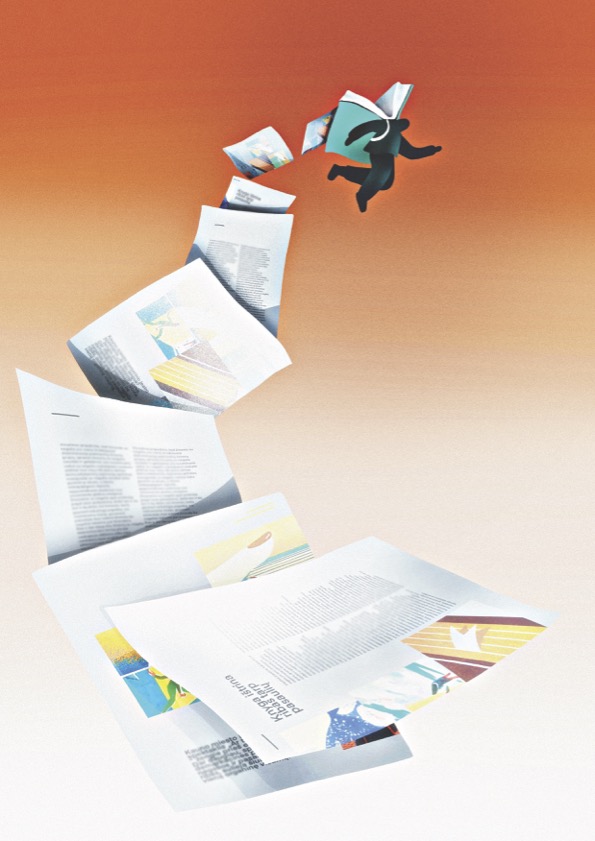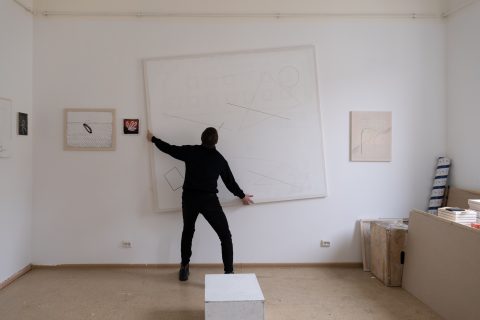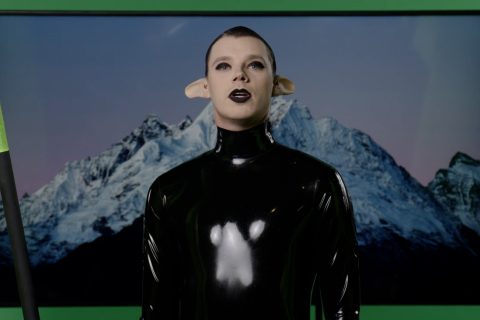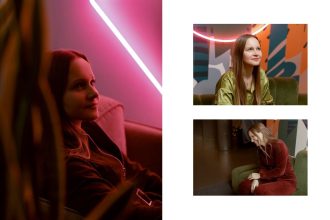At the end of 2023, two debut poetry books fell into my hands quite by chance. It was Patricija Gudeikaitė’s Procesas (process) and Marija Mažulė’s Fosilijos yra nėriniai (fossils are lace). Both touched me quite deeply and stayed with me. So, when I was contemplating whom to interview for the Debuts’ issue, I unconsciously thought about the importance of the first texts and decided to interview Neringa Butnoriūtė, a literary scholar from Kaunas (and who often returns here, because, among other activities, she teaches at the Vytautas Magnus University). At the end of the year, she was awarded the Vytautas Kubilius Prize for significant contributions to literary criticism, by the Institute of Lithuanian Literature and Folklore. Specifically, it was awarded to Neringa for “continuous attention to the latest Lithuanian literature.” Although ‘new’ does not necessarily mean ‘debuting’. According to my interviewee, a debut is a kind of application for further creative activity, and it is clear that she likes to evaluate those applications.
Neringa, why are you interested in specializing specifically in the field of contemporary authors and their texts?
When you’re involved in culture, what is most interesting is what is happening now and how it is reflected. But I think that studies at Vytautas Magnus University, where we had time for modern and postmodern processes, had a powerful impact. Everything beyond the readings assigned at school also greatly broadened my horizons, especially when I started to explore the cultural press, where battles often occur, and the latest phenomena are discussed. After becoming a regular reader, I then tried writing as well, but it was my studies that encouraged me. While studying philology, you meet people who work here and now, and read the latest texts; the most interesting discussions were precisely about the latest texts. And that renewal process never ends. To me, this field still seems relevant, interesting, and always full of surprises. It just as constantly requires you to be prepared, understand things, and adapt.
Of course, new literature does not necessarily mean new authors. But do you personally want to see some new names? How do you look for them?
My area of interest is not all literature: it is poetry, and in poetry, at least in the Lithuanian one, there are many debuts. In a year, we have at least five, while in prose it is usually one or two. We usually associate a debut with new ideas and in poetry these ideas are often more visible.
What interests me in poetry is that the field itself is very communal. There are many festivals and different events. You can get feedback very quickly. Of course, it is difficult to judge from one reading, one poem, what is really going on, so I like books because they show me the whole. Every year I try to consciously pay attention to debuts. Actually, you just caught me writing one of those reviews.

You teach future philologists – among whom there are certainly some who write – at VMU. Do they come to you for criticism, maybe comfort, or maybe very simple practical advice on how to get published?
My job is to encourage students to analyze texts, to get to know the creative process and the various concepts on which creation is based. Also, creative writing, which is very particular, and created specifically for philologists. There really isn’t much space left to share personal work because time is very limited. But it seems to me that feedback is extremely valuable. I probably wouldn’t be doing these things myself if I hadn’t received it. Therefore, when I hear from the students that they engage in writing, I try not to be a critic, but to show them the cultural press and direct them toward the platforms where people share their work and I also explain the possibilities and what that world looks like.
What about those circles, groups, movements, and associations? Isn’t there a danger of uniformity when everyone reads each other’s texts, and some become supporters and critics of others? Maybe it’s better to stay away from everything and create in the bedroom?
Associations are not very relevant to me, but when it comes to debuts, it’s a pity that the activities of extracurriculars and clubs have dwindled in universities. When I talk to like-minded people who studied at different universities, it seems that each generation had certain clubs where people gathered and discussed. Even if you were not an aspiring writer, it was still interesting to be in such an active discussion environment where everyone cares about the same thing: not only writing but also reading and participating in culture. Today, such formations have been replaced by Slemas (slam poetry event) or Literary Sprint. These are events that focus more on performance, which you visit with friends, receive feedback but there deeper literary connection to the oeuvre itself is not usually established. Another new thing that has appeared is creative writing groups, where individualists gather to achieve a very specific result.
How can a debut author reach a reader?
There are well-known events like the Filologijos ruduo event series organized by the Faculty of Philology of Vilnius University since 1980, the Literatūrinės slinktys festival of young writers and artists and Literatūrinis sprintas open mic events organized by Lithuanian Writers’ Union. You come to these places to experience young people, to see who they are.
In preparation for our conversation, I’ve been thinking about things that might stimulate a more active creative flow. The war in Ukraine affected the lives and jobs of poets and prose writers, as well as other creators. But it is a painful subject. Among the more pleasant ones, I thought about the title of European Capital of Culture. The preparation for it and the event and the finale amounted to seven years of work. Have you noticed any influence of this title on newly published poetry and prose? Maybe it’s too early to look for it?
The focus on literature during those European Capital of Culture years was rather tendentious. After all, one part of the program aimed to create a myth. Šiauliai and Vilnius seem to be more literary in this sense. So, somewhat critically, I would think that an attempt was made to artificially stage the raising of the myth. Unlike in the field of architecture, when people really discovered their city, in literature nothing was born organically. But of course, there are some beautiful things. For example, Sandra Bernotaitė’s Akys chimeros (eyes of the chimera): a novel about Salomėja Nėris and Ina Pukelytė’s novel Panelės iš Laisvės alėjos (young ladies from Laisvės Avenue), which attempts to discover broader social, psychological, and historical layers. Of course, before that, there was, for example, Kęstutis Navakas Vyno kopija (wine copy), which seems to be taking place in Kaunas, but the book doesn’t deepen the understanding of the city.
Which debuts of the last year have been the most memorable for you?
I might look at it more broadly in this case. I look for capacious speaking in literature and I really like it when the author justifies their topics and ideas. When words match the actions. They can shock me, play up to me, look for their ancestors, and write about Kaunas, but the most important thing for me is that the idea somehow succeeds in its implementation.
Talking about poetry, when it comes to this view, the authors who have already written several books stood out for me. They were Greta Ambrazaitė (the author was awarded the Jaunasis Jotvingis Prize for her poetry book Trapūs daiktai (fragile things) published in 2018. It was also selected as the best poetry book in the Book of the Year awards, ed.), Tomas Petrulis (his debut book Triukšmo gyvatė (snake of noise) was published in 2017. It was nominated for Book of the Year and Most Creative Book awards, ed.) and Vaiva Grainytė’s first poetry book Gorilos archyvai (gorilla’s archives) published in 2019.
They are very unique and stand out with an uncompromising way of thinking about the world that cannot be replicated. The authors are very different, they have a very interesting independent way of thinking, which remains beyond current affairs and is not performatively defiant but rebellious of its own accord. Their texts contain imagination and feeling, and it is very inspiring. I am more open to the text as a cat in a bag because if the older, well-known, experienced authors as well as debuts, will see you as someone who already knows everything, then you will neither be surprised nor want to experience what authors are trying to tell you.




